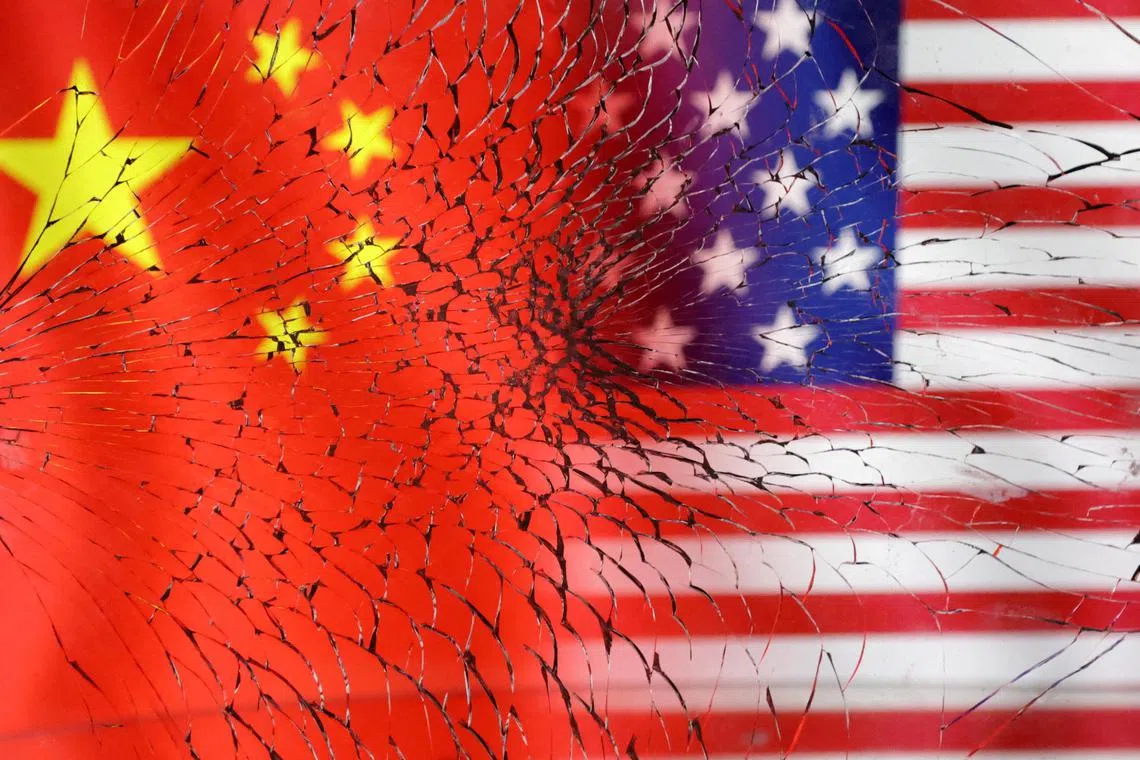Chinese tech entrepreneurs keen to ‘de-China’ as tensions with US soar
Sign up now: Get ST's newsletters delivered to your inbox

Geopolitical tensions mean a far less friendly atmosphere for mainland Chinese companies wanting to operate or gain funding in the US.
PHOTO: REUTERS
SHENZHEN - For the ambitious Chinese tech entrepreneur, expanding into the United States just keeps getting harder.
Before 2019, there were few major impediments to having a Chinese company that did business in the US from China.
But amid escalating US-China trade tensions, particularly after Washington slapped sanctions on telecom giant Huawei, some Chinese firms began setting up headquarters overseas – moves that could help them draw less US government attention.
Now, some China tech business owners say they need to go further and gain permanent residency or citizenship abroad to avoid the curbs on and the biases against Chinese companies in the US.
Shenzhen-based Ryan, who declined to give his family name due to fear of reprisals in China, says his three-year-old software start-up has reached the point where it would be natural to expand in the US – the world’s biggest economy. His firm already has a million users in East Asia and a strong base in North America.
But he is dismayed by the US-China trade spats and the restrictions on a growing number of Chinese companies that have been imposed, or are being proposed, by US lawmakers.
“It’s very unfair,” he said, lamenting that competitors from other countries did not face similar issues when trying to expand into the US.
His solution? He is trying to gain permanent residency in another Asian country.
Reuters spoke to seven tech entrepreneurs from mainland China, most of them educated overseas, who would like to expand their businesses in the US.
All are trying to gain permanent residency or citizenship elsewhere, with most exploring a range of options including Singapore, Hong Kong, Canada, Japan and the US.
Of the seven entrepreneurs, three agreed to be identified by their English first names only while the others requested complete anonymity, all citing concerns about repercussions within China. They also asked that their businesses not be described in detail.
Becoming less Chinese
While US-China tensions may have been given new impetus under the Trump administration, which levied tariffs broadly and imposed sanctions on Huawei, the friction has continued unabated under President Joe Biden as both countries vie for global tech pre-eminence.
Major flashpoints include US export curbs on chips and data security concerns that have seen ByteDance-owned TikTok banned on US government devices and altogether by the state of Montana.
For its part, China recently blocked key industries from using Micron Technology products
Geopolitical tensions have meant a far less friendly atmosphere for mainland Chinese companies wanting to operate or gain funding in the US, the entrepreneurs and consultants say.
But even if expanding into the US has become that much harder, it is still the end goal for most of the entrepreneurs Reuters spoke to.
Focusing on the domestic market is hardly an attractive option despite its size, they added.
A two-year regulatory crackdown on China’s once-freewheeling technology sector from late 2020 – which overlapped with draconian zero-Covid curbs during the pandemic – has led to their disillusionment with China under President Xi Jinping.
“Everything changed during the pandemic,” said entrepreneur Wilson, who began looking for ways to move his software start-up abroad after Mr Xi won an unprecedented third term in 2022.
He said that while it was not impossible to do business from China, distrust between Washington and Beijing had become such that “it’s easier for my employees, for my shareholders, if I’m out”.
Firms looking to rebase offshore and even “de-China” in terms of company identity have become a trend, said Shenzhen-based Mr Chris Pereira, who runs business consulting firm North American Ecosystem Institute.
Companies that have visibly de-emphasised their Chinese identity include online fast-fashion retailer Shein which has made a Singapore firm its de facto holding company.
In early May, e-commerce firm PDD Holdings moved its headquarters from Shanghai to Dublin.
So far in 2023, Mr Pereira’s firm has had around 100 inquiries from mainland companies seeking help to expand abroad.
Mr Pereira said he advises many on how to effectively localise overseas and become part of a community, as opposed to just masking their Chinese identity.
Entrepreneur Tommy has moved abroad from China, dispirited after government censorship requests concerning his product became too frequent and intrusive, leading him to shut down the business.
He is now setting up a new start-up and eventually would like to move to the US – that is despite having been questioned at length by US Customs officials as to why he had a US bank account when on a recent business trip there.
REUTERS


